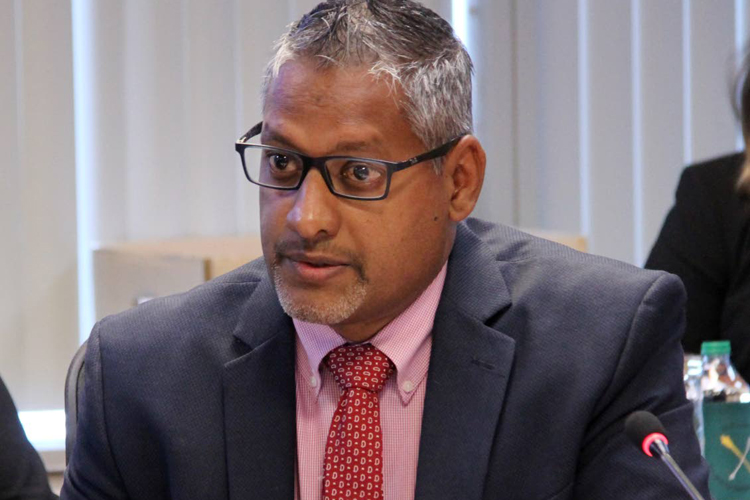Trinidad and Tobago (T&T) has made a commitment to examine the law prohibiting the transshipment of honey from Guyana into the twin-island republic, its Agriculture Minister Clarence Rambharat says.
“We have committed to have another look at the law to see if we could create that environment in which we could allow in transit, once it does not stay in the country. It is something we have to look at,” Rambharat said.
Asked why his country has never amended its legislation for trade in honey, Rambharat, who was a member of Prime Minister Dr Keith Rowley’s delegation to Guyana on Wednesday to hold talks with the David Granger administration and to sign the energy cooperation memorandum of understanding (MoU), said, “Honey is a particularly sensitive area.”
One of the reasons why the country has been very slow in allowing honey from outside, he said, “is because so far Trinidad and Tobago has been able to maintain its honey, disease-free.”
Over the last two years, he said, his ministry and the Inter-American Institute for Cooperation on Agriculture (IICA) have been working with local producers in the honey sector.
Noting Grenada’s complaint before CARICOM’s Council for Trade and Economic Development (COTED) for barring export of its honey to T&T, Rambharat said, “We agreed on a particular approach with Grenada. We are in the process of doing the risks survey analysis in Grenada and the same in [T&T].”
Noting that the Caribbean Agricultural Health and Food Safety Agency is engaged in the risks survey, he said, “We will move things along.”
Asked if a similar risk survey was being done for Guyana, he said the laws were very specific in terms of the transshipment of honey.
“I am not afraid to say we are very defensive of honey, because we have a very strong sector and a good record in honey,” he said.
Rowley, at a press conference held after the signing of the MoU at State House, Georgetown, said he was not aware that Guyana has issues with honey entering T&T. “I thought that was a Grenada issue. I did not know it was a Guyana issue as well,” he noted.
The matter was discussed at the meeting, he said, and they agreed that Minister of Foreign Affairs Carl Greenidge and Rambharat will look at the issue as it relates to Guyana.
“Without talking out of turn,” he said, “once we are satisfied that there are no phyto-sanitary risks that we should ignore, or should not ignore, we will look at it with an eye to furthering the business of Guyana without risking the biodiversity of Trinidad and Tobago, but we would be guided by the technical outcome. The last time we raised this matter at CARICOM, we agreed that the CARICOM protocol, having been checked, should prevail and Trinidad and Tobago would obey the protocol.”
At a COTED meeting in Georgetown in May, the COTED Chairman, Antigua and Barbuda Minister of Trade, Commerce and Industry Chet Greene, had said that Guyana and Grenada were among CARICOM countries that stood to benefit from the export of honey to T&T once the latter enacts legislation to facilitate the trade in honey.
He had told Stabroek News that the matter of the honey was on COTED’s agenda for non-compliance with provisions of the Revised Treaty of Chaguaramas and decisions of COTED.
He said the matter was left for the T&T Parliament to enact legislation to facilitate the movement, as its laws affected not only Grenada honey but the transshipment of honey from Guyana.
Meanwhile, land as well as food safety and related legislation pertaining to the import and export of food products between Guyana and Trinidad and Tobago were the subject of discussions between Guyana’s Minister of Agriculture Noel Holder and Rambharat.
“Both Guyana and Trinidad and Tobago have been working on modern legislation in relation to food safety. I believe your bill is in the Parliament. Our work is underway,” Rambharat said.
In an interview, Rambharat told Stabroek News that at the bilateral meeting prior to the signing, “The very first thing that we discussed was this issue of land.”
Over the years, he said, historically, the first two things that Guyana and T&T talked about was land and rice.
“What we found was that since Trinidad and Tobago exited the sugar industry and stopped growing sugar cane, we have land that is now available and we are trying to get our investors to take up that land. So we have not seen an interest in land in Guyana as yet,” he noted.
If there is an interest by Trinidadian investors to take up lands for developmental projects in Guyana, he said, “We would pursue it.”
He noted, however, that the Trinidad and Tobago Citrus Growers Association (TTCGA) is already in Guyana and has completed cultivating 300 acres of land. “That is a start,” he said. The TTCGA has been allocated 1,000 acres.
Noting that rice has always featured in their discussions over many years and that rice production is now a small but growing industry in Trinidad, Rambharat said, “One of the complaints of our farmers has been the supply of consistent quality seeds and different varieties going to Trinidad. That has been an area we have agreed to work on.”










